Did you know that personalized experiences can increase conversions by up to 15%? It’s true!
When visitors feel like a website understands their needs, they’re more likely to take action, whether it’s making a purchase, signing up for a newsletter, or contacting customer support.
Creating personalized experiences can be a daunting task for businesses.
It requires a deep understanding of customer behavior, technical expertise, and significant time and resources. That’s where the best website personalization tools come in.
These powerful tools simplify the personalization process, making it accessible to businesses of all sizes.
By leveraging the capabilities of these tools, you can deliver tailored experiences that resonate with your target audience and drive conversions.
Build trust & FOMO
Highlight real-time activities like reviews, sales & sign-ups.
Why is personalization important?
- Makes visitors feel special: When you show people content they’re interested in, they feel like you understand them.
- Increases sales: People are more likely to buy something if they see it’s relevant to them.
- Builds trust: Personalization shows people you care about their experience.
![]()
What is Website Personalization?
Website personalization is the process of creating customized experiences for website visitors by tailoring content, recommendations, and offers to their unique preferences, behaviors, and interests.
This technique involves using data and analytics to understand visitor behavior and adapt the website’s content and layout to meet their individual needs.
Definition of Website Personalization
Website personalization is a marketing strategy that involves using data and analytics to create customized experiences for website visitors.
It involves adapting the website’s content, layout, and recommendations to meet the unique needs and preferences of each visitor.
Importance of Website Personalization
Website personalization is important because it helps businesses to create a more engaging and relevant experience for their website visitors.
By tailoring content and recommendations to individual preferences, businesses can increase customer satisfaction, loyalty, and ultimately, drive more conversions and revenue.
Benefits of Website Personalization
The benefits of website personalization include:
- Increased customer satisfaction and loyalty
- Improved conversion rates and revenue
- Enhanced customer experience and engagement
- Competitive advantage over other businesses
- Improved customer insights and data analysis
Build trust & FOMO
Highlight real-time activities like reviews, sales & sign-ups.
Key Features of a Website Personalization Tools
Personalized product recommendations
Offer visitors relevant content and product suggestions based on their browsing history, purchase behavior, and preferences.
AI-powered A/B Testing
Continuously experiment with different website elements to identify the most effective combinations for your target audience.
Popups & other overlays
Engage visitors with targeted messages and offers at the right time, such as exit-intent popups or personalized recommendations.
Behavioral targeting in the customer journey
Segment visitors based on their actions on your website and create personalized content tailored to their needs, ensuring they see what matters most to them.
Dynamic content
Automatically adjust website elements like images, text, and CTAs to match the visitor’s specific characteristics or context.
Integration with other marketing tools
Seamlessly connect your personalization software with your email marketing, CRM, and analytics platforms for a unified view of your customers.
Let’s explore the top 8 website personalization tools.
#1 Wisernotify
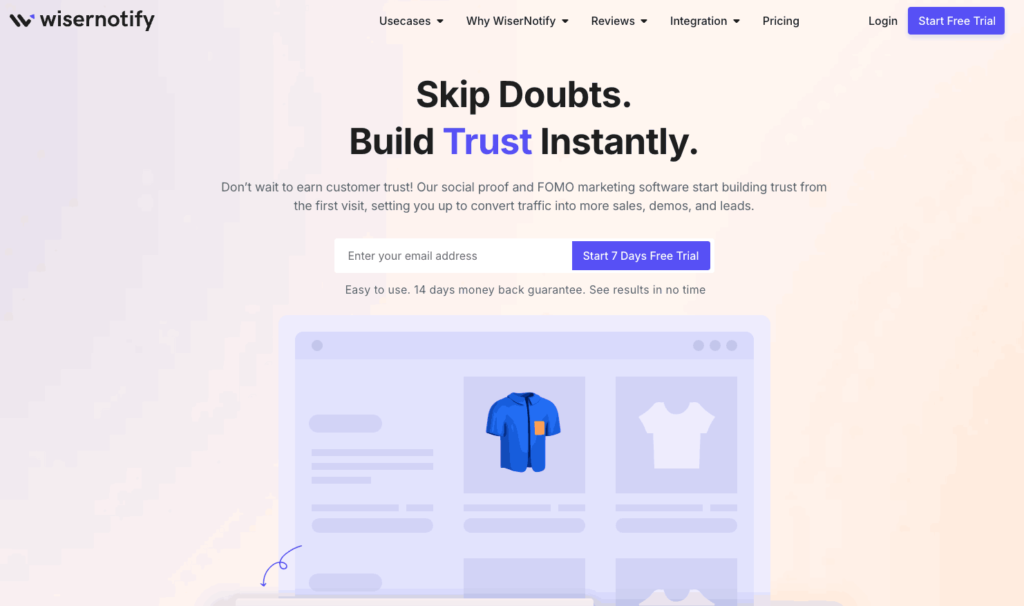
Wisernotify isn’t just a personalization tool; it’s a behavioral science toolkit.
It uses “nudges” – subtle prompts and messages – to influence user behavior. Wisernotify can help engage and convert anonymous visitors through personalized web push notifications and other marketing strategies.
Think of it as a gentle way to guide visitors towards your desired action.
Key feature: Social Proof Templates & A/B testing
What can you personalize?
Popups: Create personalized popups based on visitor behavior, location, or other criteria.
Exit-intent overlays: Capture attention with targeted messages as visitors are about to leave.
Product recommendations: Suggest relevant products based on browsing history.
Dynamic content: Change website elements in real-time based on visitor data.
Pricing:
- Free Trial: 7 Days
- Starter Plan: Starts at $16/month
- Standard Plan: Starts at $26/month
- Premium Plan: Starts at $40/month
- Agency Standard Plan: Starts at $85/month
Also see: 11 Proven Social Proof Tools to Boost Sales
#2 Mutiny
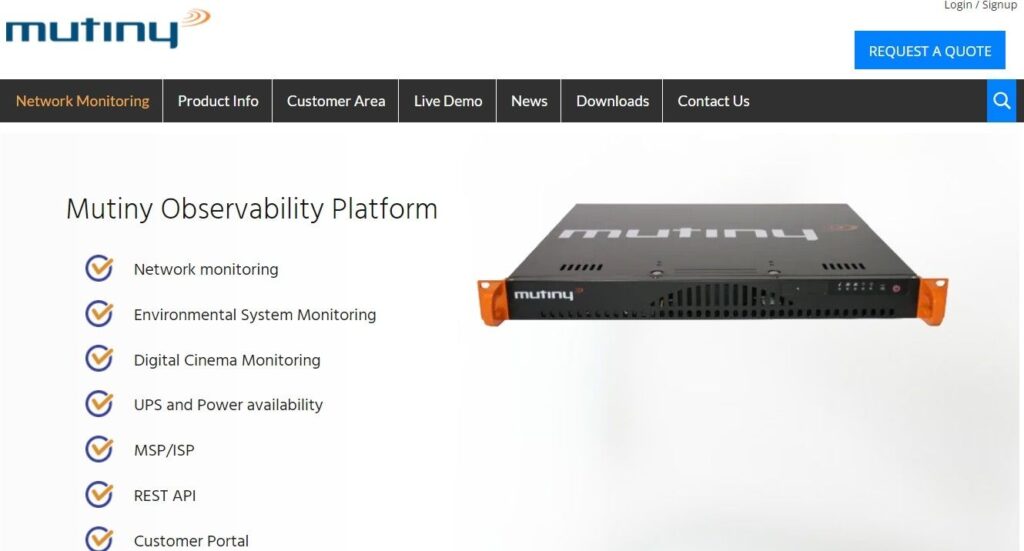
Mutiny is an AI-powered platform that helps you create personalized experiences for your website visitors. It analyzes your website data and automatically generates personalized messages and content.
By delivering these personalized experiences, Mutiny can help foster customer loyalty, leading to higher retention and satisfaction.
Key feature: AI-powered personalization
What can you personalize?
Website content: Tailor headlines, images, and CTAs to individual visitors.
Popups: Create personalized popups based on visitor behavior.
Product recommendations: Suggest relevant products based on browsing history.
Pricing:
- Custom pricing based on your needs
#3 Recombee
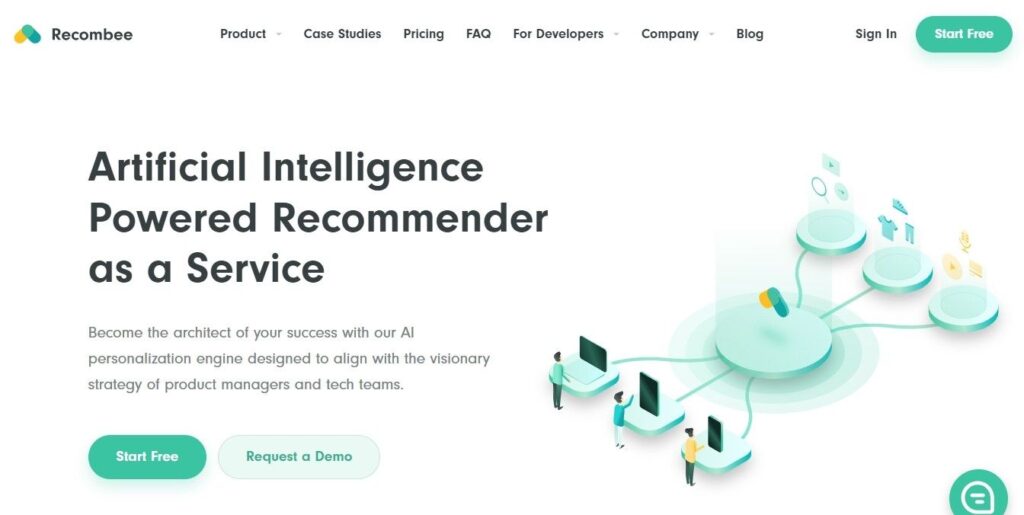
Recombee is a recommendation engine that helps you suggest relevant products, articles, or other content to your website visitors. It uses machine learning to analyze your customer data and provide personalized recommendations.
Key feature: Recommendation engine
What can you personalize?
Product recommendations: Suggest relevant products based on browsing history, purchase behavior, and preferences.
Content recommendations: Suggest relevant articles, blog posts, or other content.
Personalized email campaigns: Send tailored email campaigns based on customer data. Personalization tokens can be used in these campaigns to insert specific information about recipients, enhancing engagement and effectiveness.
Pricing:
- Custom pricing based on your needs
#4 MoEngage

MoEngage is a mobile marketing platform that also offers website personalization features. It helps you engage your customers across multiple channels and personalize their experiences.
Key feature: Omnichannel personalization
What can you personalize?
Website content: Tailor content based on visitor behavior and preferences.
Push notifications: Send personalized push notifications to mobile users.
Email campaigns: Send tailored email campaigns based on customer data.
Pricing:
- Custom pricing based on your needs
Build trust & FOMO
Highlight real-time activities like reviews, sales & sign-ups.
#5 Clevertap
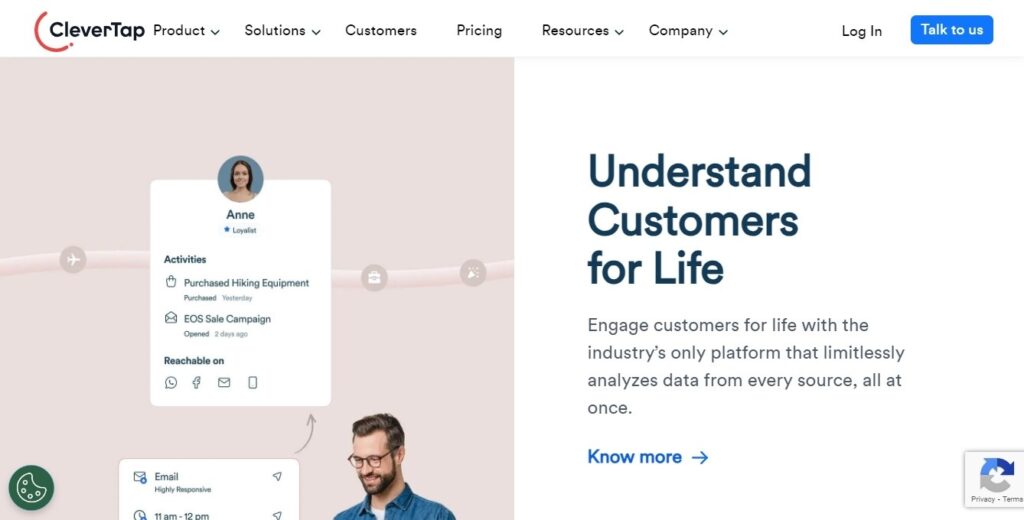
Clevertap is another mobile marketing platform that offers website personalization features. It helps you understand your customers’ behavior and personalize their experiences.
Key feature: Customer journey analytics
What can you personalize?
Website content: Tailor content based on visitor behavior and preferences.
Push notifications: Send personalized push notifications to mobile users.
Email campaigns: Send tailored email campaigns based on customer data.
Pricing:
- Custom pricing based on your needs
#6 Personyze

Personyze is a personalization platform that helps you create personalized experiences for your website visitors. It offers a variety of features, including A/B testing, dynamic content, and personalized popups.
Key feature: A/B testing
What can you personalize?
Website content: Tailor content based on visitor behavior and preferences.
Popups: Create personalized popups based on visitor behavior.
Product recommendations: Suggest relevant products based on browsing history.
Pricing:
- Essential Plan: Starts at $39/month
- Premium Plan: Starts at $59/month
- Business Plan: Starts at $389/month
#7 PathFactory
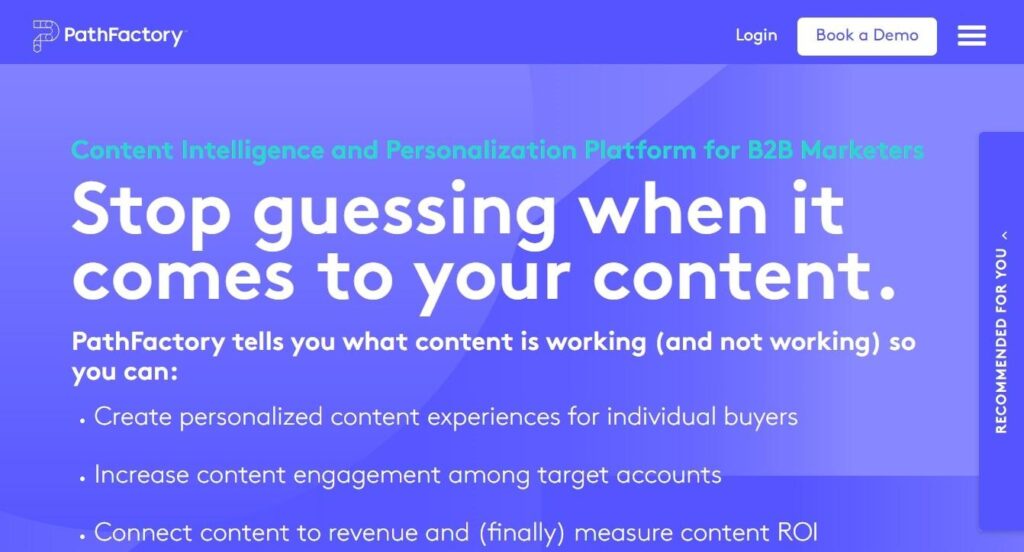
PathFactory is a personalized content platform that helps you guide visitors through your website and convert them into customers. It offers features like personalized journeys, content recommendations, and analytics.
Key feature: Personalized journeys
What can you personalize?
Website content: Tailor content based on visitor behavior and preferences.
Product recommendations: Suggest relevant products based on browsing history.
Personalized journeys: Guide visitors through personalized paths on your website.
Pricing:
- Custom pricing based on your needs
#8 Demandbase
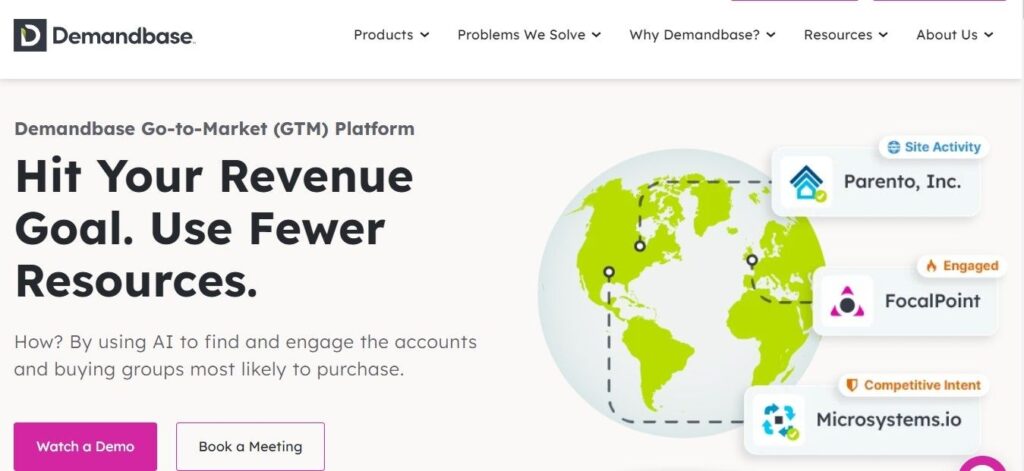
Demandbase is an account-based marketing platform that also offers website personalization features. It helps you identify and engage your target accounts with personalized experiences.
Key feature: Account-based marketing
What can you personalize?
Website content: Tailor content based on account-specific data.
Product recommendations: Suggest relevant products based on account-specific data.
Personalized journeys: Guide visitors through personalized paths based on account-specific data.
Pricing:
- Custom pricing based on your needs
Choosing the Right Personalization Tools
When selecting a website personalization software, consider the following factors:
- Your specific needs: Determine which features are most important to you, such as personalized product recommendations, A/B testing, or dynamic content.
- Ease of use: Choose a tool that is intuitive and easy to use, even if you don’t have technical expertise.
- Integration with your existing tools: Ensure the tool integrates seamlessly with your other marketing platforms.
Pricing: Compare the pricing plans of different tools to find one that fits your budget.
Build trust & FOMO
Highlight real-time activities like reviews, sales & sign-ups.
Define Your Personalization Goals
To get started with website personalization, it’s essential to define your personalization goals. This involves identifying what you want to achieve through personalization, such as increasing conversions, improving customer satisfaction, or enhancing customer engagement.
By defining your goals, you can create a clear strategy for implementing personalization on your website.
Review Each Tool’s Personalization Capabilities
When choosing a website personalization tool, it’s essential to review each tool’s personalization capabilities. This involves evaluating the tool’s features, such as data collection, segmentation, and content recommendation.
By reviewing each tool’s capabilities, you can determine which tool best meets your personalization goals and needs.
Getting Started with Personalization
Personalization is the practice of tailoring content and experiences to individual users based on their preferences, behaviors, and demographics.
Web personalization is a powerful strategy for improving customer engagement, increasing conversions, and building stronger relationships by utilizing data such as browsing behavior and past interactions.
Step 1: Define Your Goals
Before you start personalizing your content, it’s important to define your goals. What do you want to achieve with personalization? Are you trying to increase sales, improve customer satisfaction, or drive more traffic to your website?
Step 2: Collect Data
To personalize content effectively, you need to collect data about your users. This data can include:
- Demographics: Age, gender, location, etc.
- Behavior: Browsing history, purchase history, email engagement, etc.
- Preferences: Interests, hobbies, values, etc.
You can collect data through various methods, such as:
- Website analytics: Track user behavior on your website.
- Surveys: Ask users directly about their preferences.
- Social media: Analyze user interactions on social media.
- CRM data: Use data from your customer relationship management system.
Step 3: Segment Your Audience
Once you have collected data, you can segment your audience into different groups based on shared characteristics. This will help you deliver more relevant and personalized content.
Step 4: Choose Personalization Tactics
There are many different personalization tactics you can use. Some popular options include:
- Product recommendations: Recommend products to users based on their purchase history or interests.
- Personalized content: Create content that is tailored to specific user segments.
- Dynamic email content: Use conditional logic to deliver different content to different email recipients.
- Personalized landing pages: Create landing pages that are tailored to specific user segments.
Step 5: Test and Measure
Once you have implemented your personalization tactics, it’s important to test and measure their effectiveness. Track key metrics such as click-through rates, conversion rates, and customer satisfaction. Use A/B testing to compare different personalization strategies.
Step 6: Continuously Optimize
Personalization is an ongoing process. As you collect more data and learn more about your users, you can continue to refine your personalization strategies.
Common mistakes to avoid while personalizing
Personalization is the practice of tailoring content and experiences to individual users based on their preferences, behaviors, and demographics. It’s a powerful strategy for improving customer engagement, increasing conversions, and building stronger relationships.
However, personalization can be tricky to get right. If done incorrectly, it can have the opposite effect of alienating customers.
To avoid common mistakes and maximize the benefits of personalization, it’s essential to understand the key pitfalls to steer clear of.
1. Overpersonalization: While personalization is essential, it’s crucial to strike a balance. Excessive personalization can come across as intrusive or creepy, potentially alienating customers. Instead, focus on providing subtle, relevant, and valuable experiences.
2. Data Quality Issues: The quality of your data directly impacts the effectiveness of your personalization efforts. Ensure that the data you’re collecting is accurate, up-to-date, and relevant to your goals. Outdated or inaccurate data can lead to irrelevant recommendations and a negative customer experience.
3. Limited Targeting: Don’t limit your targeting to just a few demographics or behaviors. Consider a broader range of factors, such as interests, preferences, and recent interactions. This will allow you to create more nuanced and personalized experiences.
4. Ignoring Context: Personalization should be context-aware. Consider the user’s current situation, such as their device, location, or time of day. For example, a personalized email promoting a summer sale might not be relevant to a user located in a cold climate during the winter.
5. Over-reliance on Technology: While technology plays a crucial role in personalization, don’t rely solely on algorithms. Human judgment is also essential for creating meaningful experiences. Consider incorporating human input into your personalization process to ensure that recommendations are relevant and engaging.
6. Lack of Testing: Before implementing personalization strategies, it’s essential to test them thoroughly. Use A/B testing to compare different approaches and identify the most effective ones. This will help you avoid wasting resources on ineffective strategies.
7. Ignoring Privacy Concerns: In today’s data-driven world, privacy is a major concern for consumers. Be mindful of privacy regulations and ensure that you are collecting and using data ethically. Transparency and consent are key to building trust with your customers.
Additional Resources
- How to Boost eCommerce Conversion through Personalization
- Ultimate Guide to Personalized Marketing in E-Commerce
- Personalized Call to Action: Get More Clicks and Sales
Wrap up
Website personalization has become an essential strategy for businesses looking to enhance customer experiences and drive higher conversion rates. By tailoring content and offers to individual visitors based on their preferences, behaviors, and demographics, businesses can create more relevant and engaging interactions.
The top 8 website personalization tools highlighted in this overview offer a variety of features and capabilities to help you achieve your personalization goals. Whether you’re a small business or a large enterprise, these tools can provide the necessary tools to deliver personalized experiences that resonate with your target audience.






